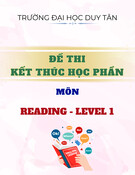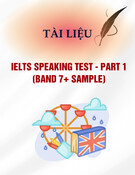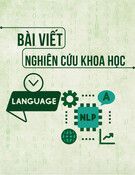
13
HNUE JOURNAL OF SCIENCE
Educational Sciences 2024, Volume 69, Issue 3, pp. 13-20
This paper is available online at https://hnuejs.edu.vn
DOI: 10.18173/2354-1075.2024-0042
EVALUATIVE STANCES IN DISCURSIVE ESSAYS BY EFL UNDERGRADUATE
STUDENTS AND THEIR REFLECTION
Nguyen Thi Huong Lan*, Pham Thuy Duong, Nguyen Lan Chi and Tran My Duyen
Faculty of English, Hanoi National University of Education, Hanoi city, Vietnam
Corresponding author Nguyen Thi Huong Lan, e-mail: huonglannt.hnue@gmail.com
Received May 11, 2024. Revised June 12, 2024. Accepted July 2, 2024.
Abstract. This research examines the use of evaluative language in academic writing essays
about living in dormitories by 15 EFL undergraduate students at a university in Hanoi. Using
Martin & White's Appraisal Framework (2005) and the UAM Corpus Tool, we analysed 15
essays (5725 words). Findings show that students predominantly use Appreciation within the
Attitude system and frequently employ quantifiers and intensifiers in Graduation, with only
one instance of a Focus item. We also interviewed 7 of the 15 Vietnamese EFL undergraduate
students to assess their awareness of the importance of evaluation in writing and to improve
their writing capacity.
Keywords: evaluative language, evaluative writing, Appraisal framework, UAM Corpus
Tool.
1. Introduction
Academic writing requires individuals to demonstrate understanding and mastery of skills
such as critical thinking, analysis, and communication within a specific academic domain (Irvin,
2010) [1]. The primary goal of an essay is to persuade readers to change their perspective or take
action, using evaluative language to express attitudes and assessments. Appraisal Theory, which
includes the dimensions of Attitude, Engagement, and Graduation, is key in this context (Martin
& White, 2005) [2]. Studies by Thomas et al. (2015) [3] on high-achieving Year 3 pupils, Liu &
Thompson (2009) [4] on Chinese and English argumentative writing, and Liu (2013) [5] on
Chinese University EFL students highlight the use of evaluative language in writing. Vietnamese
researchers, including Nguyen (2021) [6] and Tran (2019) [7], have also explored this topic.
Nowadays, evaluative language permeates every aspect of English communication. Its
importance is undeniable and EFL students are urged to be competent in applying evaluative items
to their written text if they are inclined to master the foreign language. However, only a few
English learners can smoothly and effectively incorporate evaluation into their writing. Therefore,
this study aims to study EFL undergraduate students’ ability to apply evaluative language in
advantage and disadvantage essays by addressing the two research questions:
(1) How did EFL undergraduate students show their attitude toward the entity in their English
writing for the topic?
(2) What are students' reflections on using evaluation in their writing?

Nguyen THL*, Pham TD, Nguyen LC & Tran MD
14
2. Content
2.1. Theoretical background
2.1.1. The Appraisal Framework
Martin & White developed the Appraisal Framework based on the theoretical model of
Systemic Functional Linguistics. Martin and other SFL scholars regionalised appraisal resources
as categorizations, grouping them into three evaluation subsystems: attitude, engagement, and
graduation (Martin & White, 2005) [2] (see Figure. 1).
Attitude
The Attitude resource is responsible for our feelings towards things, our evaluation of human
behaviours, and our assessment of phenomena. Affect is used in expressing our emotional
expressions. Judgement deals with resources for evaluating human behaviours or personalities.
Appreciation, resources for construing the value of entities, can be either positive or negative and
conveyed either invoked or inscribed.
Graduation
Up-scaling or down-scaling is what the Graduation resource does to grade the other two sub-
categories within the Appraisal System: Attitude and Engagement. The scaling function operates
on two categories: Force and Focus.
Figure 1. An overview of the Appraisal system (Adapted from Martin and White 2005)
Graduation within the scope of Attitude
Working with Attitude resources, Graduation is a general property of values that they
construe as greater or lesser degrees of positivity or negativity (Martin & White, 2005) [2].
Graduation can manifest within attitudinal words (e.g., better, primary) or be embedded
separately within attitudinal meanings (e.g., more beautiful, many difficulties). These
mechanisms of graduation enhance its value in both positive and negative contexts.
2.1.2. Evaluative writing
Evaluative writing involves assessing subjects like people, objects, and phenomena based on
specific standards or criteria. It crosses many fields, such as psychology, music, art, literature,
Appraisal
system
Attitude
Graduation
Appreciation
Judgement
Affect
Force
Focus
Un/happiness
In/security
Dis/satisfaction
Dis/inclination
Social esteem
Social sanction
Reaction
Composition
Normality
Capacity
Tenacity
Veracity
Propriety
Impact
Quality
Balance
Complexity
Sharpen
Soften
Intensification
Quantification
Inscribed
Invoked

Evaluative stances in discursive essays by EFL undergraduate students and their reflection
15
and film, and is frequently used in situations like product reviews and assessments. By employing
evaluative language, authors make their commitment and position clear, which improves reader
understanding.
2.1.3. Discursive essay
Discursive essays frequently pose the question, “Do advantages outweigh disadvantages?”.
This type of essay requires the writer to explore both sides of an issue before reaching a
conclusion. To do this effectively, they must structure their arguments and use evaluative
language to advocate for one certain side or both sides. Our research examines how students
evaluate the pros and cons of living in university dormitories, aiming to encourage their use of
evaluative language. We examine how students incorporate this language into discussions about
dormitory living.
2.2. Research methodology
2.2.1. Research design
The study employed both quantitative and qualitative methods. The researchers employed
Martin & White's (2005) [2] Appraisal framework to evaluate the attitude resources expressed in
the written work of EFL undergraduate students.
2.2.2. Data collection method
2.2.2.1. Participants
Fifteen third-year EFL students in class A1 at the Faculty of English were involved in the
research through two stages: (i) writing a discursive essay and (2) reflecting on how they use
evaluative resources through a questionnaire.
2.2.2.2. Instruments
(1) Writing test: Students were asked to write a discursive essay in 40 minutes about the
following topic: “What are the advantages and disadvantages of living in a dormitory on a
university campus? Do the advantages outweigh its disadvantages?”
(2) Questionnaire: A questionnaire for students consists of four items:
Item 1. In your opinion, what is evaluative writing?
Item 2. As a student, is it necessary to use evaluation in writing?
Item 3. How difficult do you think it is to present an evaluation in writing?
Item 4. What are the difficulties you find in presenting evaluation in writing? Why?
2.2.3. Data collection procedure
Step 1: Collecting discursive essays and identifying evaluative resources
We gathered a total of 15 discursive writings from class A1 at the Faculty of English. In
order to facilitate data analysis, attitudinal means were emphasised using three distinct colours:
pink for affect, blue for judgement, and green for appreciation. For graduation means, we use
yellow for intensification, brown for quantification, and red for sharpening .
Step 2: Answering the questionnaires
Students answered the questions, and the researcher collected the questionnaires filled out by
the EFL undergraduate students for analysis.
2.2.4. Data analysis methods
The study aims to assess the writing skills of fifteen third-year EFL students at a university
in Hanoi using both qualitative and quantitative analysis. The CORPUS TOOL facilitates the
recording of statistical data, enhancing the research approach with strong empirical proof. The
research examines the students' attitudes and lexico-grammatical expressions in their English
compositions using questionnaire feedback and interviews. The EFL undergraduate students’
perspectives on their writing methods are clarified by a thorough qualitative evaluation, which is

Nguyen THL*, Pham TD, Nguyen LC & Tran MD
16
complemented by illustrative quantitative analyses. The study seeks to address important research
inquiries regarding the expression of attitude in writing, students' thoughts on the use of attitudinal
techniques, and suggestions for improving preparedness in evaluative writing.
2.3. Findings and Discussion
Question 1: How did EFL undergraduate students show their attitude to the entity in
their English writing for the topic?
Table 1. Overview of Appraisal distribution
No. of texts
Total word account
Appraisal expression frequency
Total
15
5752
465
2.3.1. Overview of Appraisal Distribution
Data collected from 15 advantages and disadvantages essays will be analysed in different
aspects to figure out how EFL undergraduate students employ evaluative language in their
writing. As shown in Table 1, 465 evaluative lexical items are used, accounting for approximately
8.1% of total words. This illustrates that EFL undergraduate students are aware of the use of
evaluation in judging a particular subject.
2.3.1.1. Overview of each category
According to Table 2, EFL undergraduate students mainly use Appreciation resources when
discussing living in dormitories. This aligns with Tran's (2019) [7] findings on EFL students'
language choices in topics like the Internet and Movies, as well as Yang's (2016) [8] study on
Chinese college students' essays. These similarities suggest that, when evaluating objects or social
events, authors tend to employ more Appreciation language. Judgement and Affect language are
less common, with 48 instances of Judgement and 29 instances of Affect. This trend contrasts
with Nguyen's (2021) findings, but it also aligns with Nguyen & Nguyen's (2021) [9] research on
Vietnamese secondary school students. This indicates that different education levels influence the
use of evaluative language.
In terms of the Graduation system, Force is most prevalent in these essays while Focus is
minimally used, echoing Liu's (2013) [5] findings on Chinese EFL students and Thomas et al.'s
(2015) [3] study on eight-year-old students' essays. Similarly, Jalilifar & Hemmati (2013) [10]
found that Kurdish-speaking learners employ more Force than Focus. These parallels emphasise
that both college and elementary students tend to strengthen their arguments with Force language,
regardless of the topic or genre, highlighting the effectiveness of quantifiers and intensifiers in
essay writing.
Table 2. Overview of each category
Appraisal resources
Subsystems
Number
Total
Attitude
Affect
29
378
Judgement
48
Appreciation
301
Graduation
Force
86
87
Focus
1
Total
465
Table 2 provides an overview of the Attitude and Graduation system, with each subcategory
slated for further analysis in subsequent sections.

Evaluative stances in discursive essays by EFL undergraduate students and their reflection
17
2.3.2. Attitude analysis
2.3.2.1. Affect analysis
Table 3. Affect resources
Categories
Number
Total
Un/Happiness
5
29
Dis/Satisfaction
10
In/security
7
Dis/Inclination
7
Explicitness
Number
Total
Inscribe
28
29
Invoke
1
Polarity
Number
Total
Positive
13
29
Negative
16
Table 3 details the subsystem that EFL undergraduate students use the least frequently. The
last use of Affect resources is considered to be a characteristic of the argumentative genre (Lee,
2006 [11]; Liu & Thompson, 2009 [4]). Therefore, not only does this pattern appear in
argumentative essays, but it also appears in other types of essays, including advantage and
disadvantage essays.
EFL undergraduate students rarely repeated the same word multiple times. For instance, to
describe the feeling of Dis/Satisfaction, EFL undergraduate students use numerous words such as
uncomfortable, disturbed, dissipate, convenient, etc. However, the subcategory Dis/Inclination is
against this, while the word want is commonly repeated.
Moreover, EFL undergraduate students exhibit slightly more negative feelings than positive
ones, indicating a lack of affection for living on campus.
2.3.2.2. Judgement analysis
Table 4. Judgement resources
Categories
Number
Total
Normality
6
48
Capacity
34
Tenacity
1
Propriety
4
Veracity
3
Explicitness
Number
Total
Inscribe
48
48
Invoke
0
Polarity
Number
Total
Positive
40
48
Negative
8



![Mẫu câu viết thư thân mật bằng Tiếng Anh [Chuẩn Nhất]](https://cdn.tailieu.vn/images/document/thumbnail/2025/20250708/caotiendat91211.thd2017@gmail.com/135x160/80151751961845.jpg)
![Tài liệu gợi ý viết email tiếng Anh và 35 đề thi mẫu [chuẩn SEO]](https://cdn.tailieu.vn/images/document/thumbnail/2025/20250708/caotiendat91211.thd2017@gmail.com/135x160/25321751961846.jpg)







![Đề cương môn Tiếng Anh 1 [Chuẩn Nhất/Mới Nhất]](https://cdn.tailieu.vn/images/document/thumbnail/2025/20251130/cubabep141@gmail.com/135x160/51711764555685.jpg)










![Mẫu thư Tiếng Anh: Tài liệu [Mô tả chi tiết hơn về loại tài liệu hoặc mục đích sử dụng]](https://cdn.tailieu.vn/images/document/thumbnail/2025/20250814/vinhsannguyenphuc@gmail.com/135x160/71321755225259.jpg)


